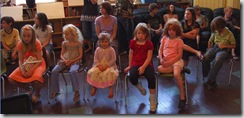[A version of this article first appeared as a post on my blog From the Front of the Choir]
The way an audience responds can affect our performance. In the absence of feedback, our most negative thoughts can raise their ugly heads.

If an audience is unresponsive, we can start to believe that we’re not performing very well.
Audience dynamics are a very strange thing. Sometimes it’s as if you’re performing to the living dead, and yet afterwards you might have loads of people coming up to you saying how wonderful the concert was.
At other times the audience is far more animated and full of smiling faces, and yet there is hardly any feedback when the concert is over.
But however the audience respond, the first few moments of a concert tend to set the mood for the rest of the night.
At one concert we had around 60 singers so it took a while to get on stage. Usually people start clapping as soon as we enter, then it wanes a bit as they realise how many of us there are! But this time we entered in complete silence. There were around 120 people in the audience and you could have heard a pin drop.
I decided to make a joke of it and tiptoed from one side of the choir to the other asking in a loud stage whisper if the singers were OK. Gradually the audience began to laugh and warm to us, and when the final singer took their place, the whole audience applauded loudly.
It was a great concert – one of our best – but the audience was very unresponsive and sleepy throughout. The main reason was that the heating was oppressive. This was putting the audience to sleep and over-heating the singers on stage.
Despite this, we had loud encore calls, and the whole audience joined in with some songs at the end.
We once played to an elderly audience who were having their harvest supper. Unfortunately we were on after the meal. Not only did the venue stink of cabbage, but pretty much everyone in the audience nodded off during the concert!
Quite often our venues are churches. We once played in a church where there was no applause at all. This was very unexpected and completely threw us.
I realised that perhaps the audience weren’t used to seeing concerts in churches, so without trying to fish for applause, I did point out that clapping was allowed, and from then on the concert went with a swing!
I suppose with confidence and experience it is possible not to be affected by an audience’s response, but it still gets to me after over 30 years as a performer.
There I am up on stage trying my hardest and enjoying myself, but I only have to catch the eye of a seemingly disinterested or bored-looking audience member and all the doubts start creeping in: maybe they don’t like me; perhaps I’m not performing very well; it’s not their taste and there’s another hour and a half to go; etc. etc.
Of course, as a choir leader I have my back to the audience most of the time, but I do try to get them on my side with a bit of banter between songs and it sometimes feels like I’m a stand-up comic who’s dying! Usually, of course, it is our own internal critics talking and the audience are actually having a great time.
Once we preformed at a wedding service and sang Ladysmith Black Mambazo’s version of Amazing Grace. I was having such a great time conducting and was dancing around and joining in.
Afterwards the choir told me that if looks could kill, I would have been dead by then! Apparently pretty much the whole congregation – who had been expecting the well-known version of the song – looked daggers at the choir and were sour-faced throughout. Luckily I had my back to them.
It is very hard to keep positive and perform well when you are faced with a sea of blank, bored-looking faces. Sometimes you might spot an audience member who has dropped off to sleep. Once the whole of the front row grimaced as one (like they were sucking lemons) because they didn’t appreciate the finer points of clashing Georgian harmonies.
It’s easier said than done, but in many ways we have to sing for ourselves in a concert. We’ve done the preparation, we’re there because we love to sing, we’re all dressed up in our finery and look impressive. It’s just an added bonus if the audience like what we’re doing. WE like it, and that’s perhaps what counts the most.
So remember:
What kind of audience member are you? Do you smile all the time or frown in concentration? Do you whoop loudly at the end or clap politely? Are you the sort of audience member you’d like to have at one of your concerts?
How do you respond to a sea of blank faces? Do audiences affect how you perform? What kind of feedback do you want from an audience? Do you have any concert stories to tell?
Chris Rowbury
website: chrisrowbury.com
blog: blog.chrisrowbury.com
Facebook: Facebook.com/ChrisRowbury
Twitter: Twitter.com/ChrisRowbury